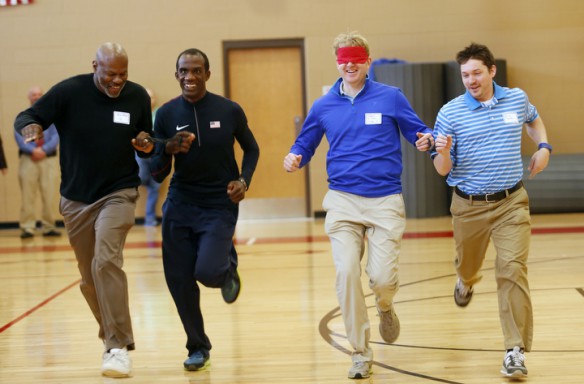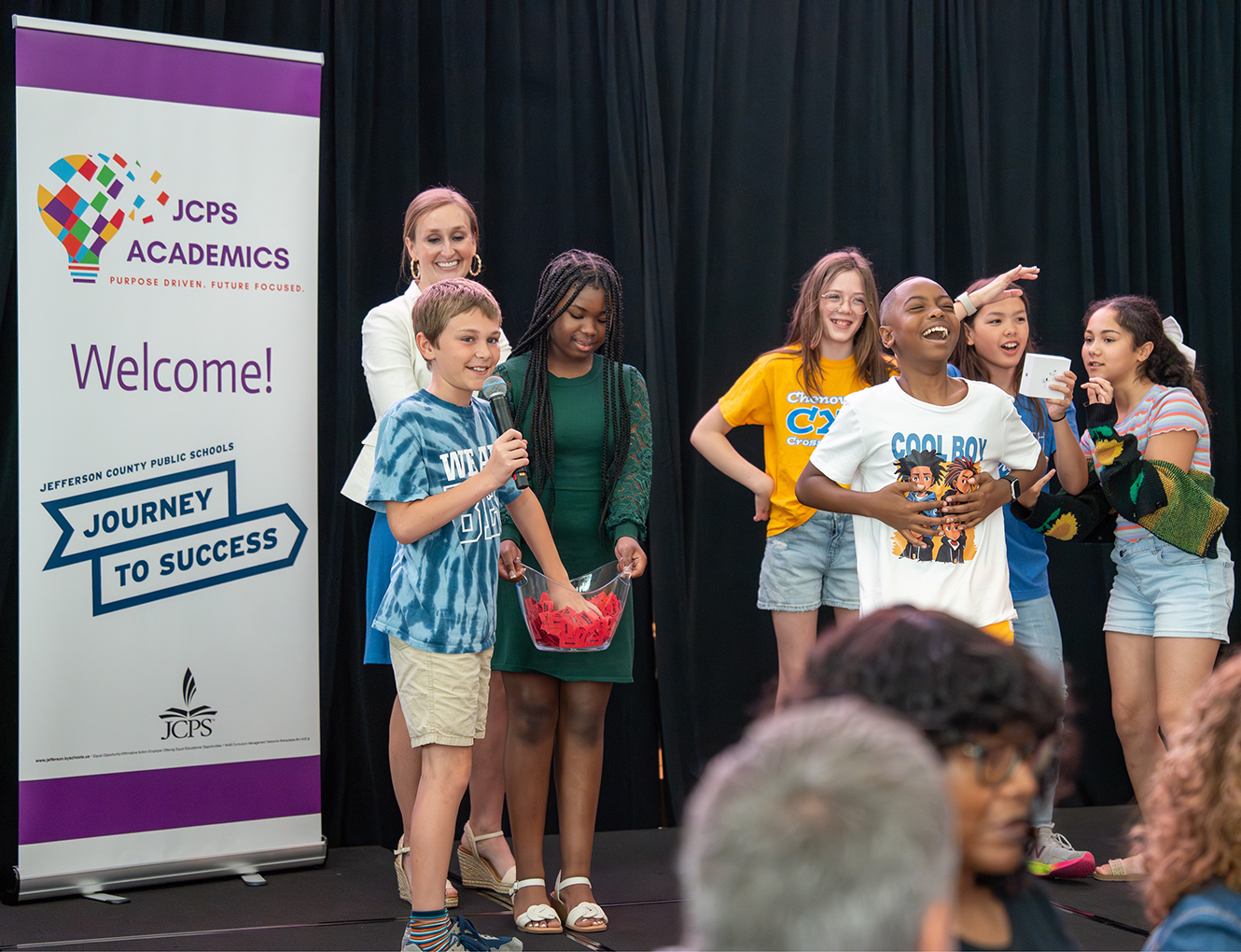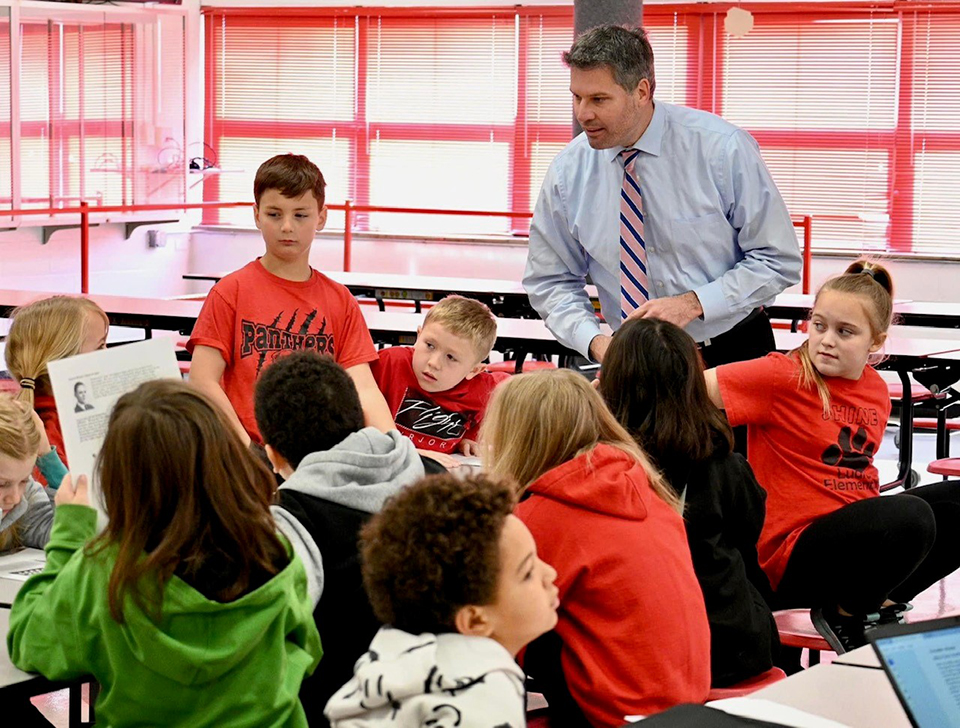
James Alcorn, a physical education teacher at Ashland Elementary (Fayette County) and Paralympic athlete Lex Gillette race Stephen McCauley, a physical education teacher at Paris High School (Paris Independent) and Brian Newton, a special education teacher at George Rogers Clark High School (Clark County) during the Adaptive Sports and Curriculum for Physical Education professional development. Gillette was teaching them how visually impaired athletes run tethered to a seeing partner.
Photo by Amy Wallot, Feb. 25, 2015
By Mike Marsee
michael.marsee@education.ky.gov
They couldn’t see a thing, they were lying on the floor, and someone was throwing a ball at them.
This was clearly not your typical professional development day. Nor was it as dangerous as it might seem. In fact, the teachers who took part in a demonstration on adaptive recreation for physical education classes were enjoying themselves as they learned how they can make their classes more accessible to all students.
About 60 educators, many of them physical education teachers, attended the training last month at George Rogers Clark High School (Clark County). They donned light-blocking goggles to play goalball, a team sport specifically designed for visually impaired athletes, and they learned to run blindfolded as a guide ran alongside to tell them when to turn or stop.
More importantly, they also learned how they can incorporate such activities into their classes.
“This is excellent advice on how to work with students with visual impairments, how to incorporate everybody into the physical education classroom,” said Lindsay Pritchett, a teacher of the visually impaired in the Anderson County school district.
The training featured two Paralympic athletes, both visually impaired, who talked about their experiences and demonstrated curriculum that teachers can use in their schools. There was also a classroom session on schools’ legal responsibilities regarding participation in extracurricular activities.
“I hope they have more confidence going into the classroom and providing recreation to their kiddos with disabilities, especially today with low- to no-vision students,” said David Wickstrom, who coordinated the event through his role as director of operations at Independence Place, a resource center in Lexington that serves people with disabilities.
Wickstrom said he is working to hold similar training programs regularly across Kentucky. He is planning more sessions for this summer and wants to hold them four or five times a year in multiple locations.
“It’s a fun training. I think a lot of your professional developments are in the library or just sitting there, and this is actually physical, hands-on. You’re sweating and you’re rolling on the ground and you’re having fun,” he said. “And it’s useful information you can take back and implement immediately. We’re telling you how to implement this, and you’re getting it from experts.”
The experts who demonstrated their sports last month at George Rogers Clark included Lex Gillette, who has won silver medals in the long jump at the last three Paralympic Games and has won four medals and one world record and four medals in three track and field events at the International Paralympic Committee Athletics World Championships; and Amanda Dennis, a University of Georgia student who won a silver medal in the 2012 USABA National Goalball Championships and competed in the 2012 Paralympics.
“I think teachers should come out of this and say, ‘We know how to adapt track and field now. We know what goalball is, and this is a really great sport, and we know about other sports that you can participate in,’” Dennis said. “So instead of going to PE and saying, ‘Sorry, Billy, you have to sit on the sideline,’ you can actually put them in the game and get them involved, because I never sat out in PE.”
Nancy Nichols, an outreach consultant for Kentucky School for the Blind, said that’s why this event was created, noting her collaboration with the project started with a conversation with a student who has no vision.
“A former student was struggling with her lack of participation in PE class unless she was at the Kentucky School for the Blind (KSB). I had collaborated with Dave Wickstrom, who is president of Beep Baseball Kentucky, on a family event for students with visual impairments, and during one of our meetings he shared an idea for training teachers in adaptive recreation. I couldn’t pass up the opportunity to be a part of this project,” Nichols said.
Nichols said the training is also largely about awareness, both for teachers and for their students who don’t have disabilities.
“We hope it gives them a different look on physical education, and they can focus on the child’s ability not disability,” she said. “I think it’s going to build empathy as well as awareness and touch all kids in a positive way.”
Pritchett and Stacy Briscoe, a physical education teacher at Emma B. Ward Elementary in Anderson County, said they think sports such as these can bring together students who are visually impaired and those who are not.
“Everybody can be incorporated into what they’re doing,” Pritchett said. “And the other students just get to know these kids and how they’re functioning from day to day,” Briscoe added.
Wickstrom said that’s one of his goals in creating these trainings.
“In the long run, the bigger idea is we obviously want to include kids, but we have to change a mindset that people with disabilities are unable to do certain things,” he said. “Our future bosses and executives are walking through these schools right now, and if they have a good relationship with their peers and they understand that it’s about changing your mindset, they’ll see that just because you’re in a wheelchair doesn’t mean you have an intellectual disability or you can’t have a conversation or you can’t do the same work.”
Last month’s training was offered primarily to physical education teachers and primarily to teachers in the Lexington area, but he said he has already heard from a number of general education teachers who would like to be involved as well.
“In the future, we’re going to open it up to all teachers,” he said. “The classroom portion is going to be best practices of inclusion. How do we best include our students in the classroom, not even in recreation, but just in the regular classroom, so students don’t see a disability, they see their ability? They’re not being seen as they can’t do something, but they’re actually doing something, which changes their mindset.”
The Kentucky Department of Education (KDE) is giving professional development credit for teachers and leadership credit for administrators to those who attend.
“There aren’t really a lot of trainings specialized for physical education, so it’s a good opportunity,” Nichols said.
One administrator who attended the first session last month was Clark County Superintendent Paul Christy, whose high school hosted the event and whom Wickstrom said is “100 percent in on adaptive rec.”
“There’s so much more that we could be doing to help students. My teachers that are here today are already starting to hit me up for some of the things to help include this into their classrooms, and I think it’s something that the kids would enjoy,” Christy said. “I think it’s important, not only here at this school but at any school, that the teachers have all the tools available to them and that the things they can do in their classroom are all-inclusive. It’s a way of leveling the playing field, and I think they’re fun things that they’re doing. It’s something that I would like to work with my entire staff, not just our PE teachers, and there may be a possibility for this summer to do some team-building things with our entire staff.”
Wickstrom said he can help schools obtain equipment for sports such as goalball and beep baseball at cost, and he said Paralympic athletes such as Gillette are interested in returning for future trainings. He said teachers who are interested in future trainings should contact him.
“The best thing is for teachers to email me and let me know they’re interested,” Wickstrom said. “We’ll get back with them and put them on our mailing list, so when we have our next training in July they’ll know. And hopefully the word of mouth will spread quickly.”
MORE INFO …
Stacy Briscoe stacy.briscoe@anderson.kyschools.us
Paul Christy paul.christy@clark.kyschools.us
David Wickstrom dave@ipky.org
Nancy Nichols nancy.nichols@ksb.kyschools.us
Lindsay Pritchett lindsay.pritchett@anderson.kyschools.us



Leave A Comment